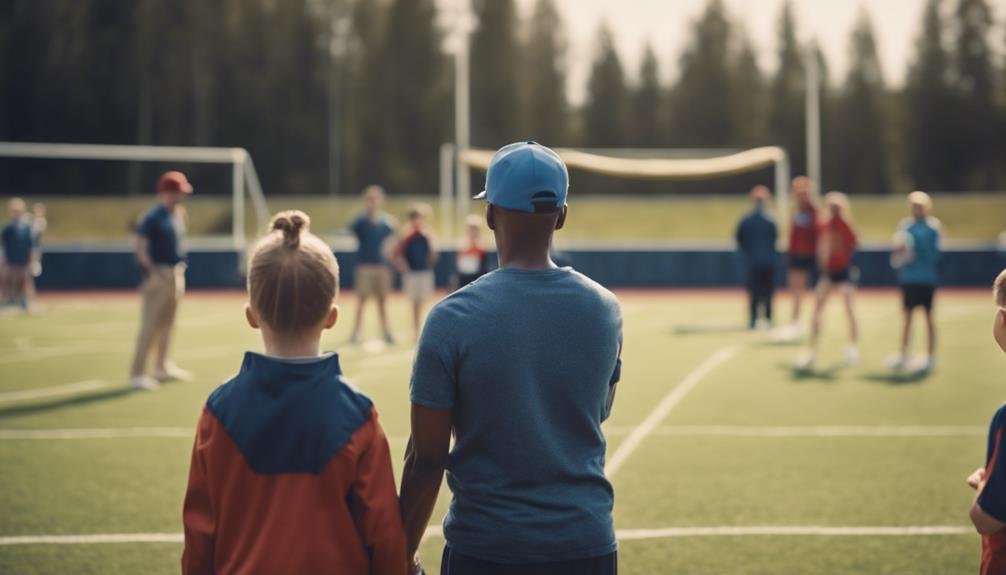"Cherishing Little Steps - A Haven for Baby and Family Journeys"
Tips for Introducing Your Child to Competitive Sports
As you navigate the world of competitive sports with your child, the journey may seem challenging at first, but with the right approach, it can be incredibly rewarding.
From choosing the right sport to nurturing good sportsmanship, there are key tips that will lay a solid foundation for your child's athletic endeavors.
By focusing on these essential aspects, you can help your child not only excel in their chosen sport but also develop important life skills that will benefit them beyond the field or court.
Key Takeaways
- Prioritize personal development and enjoyment over winning in competitive sports.
- Foster good sportsmanship, teamwork, and support for teammates.
- Find a qualified coach who values holistic development and inspires passion for sports.
- Establish a structured schedule for practice, balancing skill improvement and relaxation.
Choosing the Right Sport

When considering the right sport for your child, it's important to take into account their interests, strengths, and physical abilities. Finding a sport that aligns with what they enjoy can greatly enhance their overall experience. Encourage them to explore different activities to see what resonates with them the most. Whether it's team-based like soccer or individual like swimming, the key is to support their journey in discovering what they love.
As your child gets involved in a sport, focus on their skill development. Every child progresses at their own pace, so celebrate their small victories and improvements along the way. Help them set achievable goals that will keep them motivated and engaged. By nurturing their skills and providing positive reinforcement, you can boost their confidence and enjoyment of the sport.
Setting Realistic Expectations
As your child explores their chosen sport, it's important to establish realistic expectations that foster growth and enjoyment in their athletic journey. Setting achievable goals will help your child progress steadily and build confidence along the way.
Here are some tips to guide you through this process:
- Realistic goals: Encourage your child to set targets that are challenging yet attainable. This will prevent feelings of frustration and maintain their motivation to improve.
- Positive reinforcement: Celebrate small victories and milestones to keep your child motivated. Acknowledging their progress, no matter how minor, will instill a sense of accomplishment and drive to continue working hard.
- Focus on personal development: Emphasize the importance of personal growth over winning. Encourage your child to learn from both successes and failures, fostering a healthy attitude towards competition and self-improvement.
Emphasizing Fun and Enjoyment

To safeguard your child's enjoyment and fun in competitive sports, prioritize creating a positive and engaging environment that focuses on their growth and happiness. Parental involvement plays an important role in ensuring your child's experience is enjoyable. Avoid putting unnecessary pressure on them to perform at a certain level. Instead, focus on their development and the social skills they can gain from participating in sports.
Encouraging fun and enjoyment should be at the forefront of your approach. Emphasize the importance of trying their best and celebrating their efforts, rather than solely focusing on winning or losing. Create a supportive atmosphere where mistakes are seen as learning opportunities and where your child feels comfortable exploring their abilities.
Encouraging Good Sportsmanship
Wondering how you can instill the value of good sportsmanship in your child as they engage in competitive sports? Teaching respect and promoting teamwork are essential aspects of encouraging good sportsmanship. Here are three essential ways to instill these values in your child:
- Lead by Example: Show your child what good sportsmanship looks like by demonstrating respect towards opponents, coaches, and officials. Your actions speak volumes, and your child will learn from how you conduct yourself during games and interactions with others.
- Emphasize Teamwork: Highlight the importance of working together towards a common goal. Encourage your child to support their teammates, communicate effectively, and celebrate both victories and losses as a team. Teamwork fosters a sense of unity and teaches valuable life skills beyond the sports field.
- Acknowledge Effort Over Outcome: Shift the focus from winning at all costs to valuing effort, improvement, and resilience. By praising your child's hard work and dedication, you reinforce the idea that sports are about personal growth and learning, not just the final score. Encouraging a positive attitude towards the process helps instill a healthy perspective on competition.
Finding a Qualified Coach

When searching for a qualified coach to guide your child in competitive sports, prioritize experience and expertise in the specific sport of interest. Coach selection is vital, as they'll not only teach the technical skills but also shape your child's attitude towards competition. Look for a mentor coach who not only excels in the sport but also values sportsmanship and holistic development.
Finding the right coach involves more than just their qualifications; it's about finding someone who can connect with your child on a personal level. Observing how they interact with other children, their coaching style, and their ability to motivate young athletes are essential factors to consider. A good coach inspires and encourages, instilling confidence and a love for the game in your child.
Don't hesitate to ask questions about their coaching philosophy, experience working with children, and approach to handling both victories and defeats. Your child's coach will play a significant role in their sports journey, so take the time to find someone who not only enhances their skills but also nurtures their passion for sports.
Balancing School and Sports
Balancing schoolwork and sports commitments can be challenging, requiring careful planning and time management to make sure both areas receive adequate attention. It's crucial to find a harmonious balance between excelling in academics and pursuing athletic goals. Here are some tips to help you navigate this delicate balance:
- Prioritize Tasks: Create a schedule that allocates time for both schoolwork and sports activities. Prioritize tasks based on deadlines and importance to make sure you stay on top of your responsibilities.
- Effective Time Management: Learn to manage your time efficiently by breaking down tasks into smaller, manageable chunks. This will help you make the most of your study sessions and sports practices without feeling overwhelmed.
- Open Communication: Keep an open line of communication with your teachers, coaches, and parents. If you're struggling to juggle school and sports, don't hesitate to seek guidance and support from adults who can help you find the right balance.
Fostering a Supportive Environment

To create a nurturing environment for your child's athletic journey, it's important to foster a supportive atmosphere that encourages growth and resilience. Creating positivity around your child's sports participation is key to their development. Cheer them on during practices and games, emphasizing effort and improvement rather than just outcomes. Celebrate their successes, no matter how small, to boost their confidence and motivation.
Establishing trust is another essential aspect of fostering a supportive environment. Your child should feel comfortable coming to you with any concerns or struggles they may have. Listen actively, provide guidance, and show understanding to build a strong foundation of trust. Encourage open communication and be a source of unwavering support throughout their sports journey.
Teaching Time Management Skills
Establishing effective time management skills is essential for your child's success in competitive sports, helping them balance their athletics with academics and other commitments. Here are some tips to assist you in guiding your child through this vital aspect of their sports journey:
- Time Management Strategies: Encourage your child to create a schedule that includes designated times for practice, homework, and relaxation. Teach them to prioritize tasks and set achievable goals to make the most of their time.
- Practice Routines: Help your child develop consistent practice routines that align with their goals. Consistency is key in improving skills and building confidence in their abilities.
- Parental Involvement, Communication Techniques: Stay involved in your child's schedule without becoming overbearing. Communicate openly about their commitments and help them find a healthy balance between sports and other responsibilities.
Building Physical and Mental Strength

Encouraging your child to focus on both their physical and mental well-being is key to preparing them for the challenges of competitive sports. To help them develop the necessary strength, consider incorporating nutrition tips and emphasizing mental toughness. Ensuring they are well-fueled and mentally resilient can make a significant difference in their performance and overall well-being.
| Nutrition Tips | Mental Toughness |
|---|---|
| Balanced meals rich in fruits, vegetables, lean proteins, and whole grains can provide the energy your child needs to excel in sports. | Teach your child the importance of perseverance, positive self-talk, and the ability to bounce back from setbacks. Encourage them to visualize success and stay focused during challenging moments. |
| Hydration is also critical for best performance. Make sure your child drinks plenty of water before, during, and after practices or games. | Foster a growth mindset by emphasizing that mistakes are opportunities to learn and improve. Celebrate their efforts as much as their victories to build resilience. |
| Avoid sugary snacks and prioritize whole foods to sustain energy levels and support muscle recovery. | Encourage your child to set goals, both short-term and long-term, to keep them motivated and driven towards success. |
In addition to these tips, focusing on injury prevention and understanding team dynamics can further enhance their physical and mental strength. By instilling these practices early on, you can equip your child with the tools they need to thrive in competitive sports.
Addressing Performance Anxiety
Addressing performance anxiety can greatly impact your child's ability to excel in competitive sports. It's normal for young athletes to feel nervous before a big game or competition, but helping them manage these feelings is vital for their performance improvement and self-confidence.
Here are three essential ways to support your child in coping with performance anxiety:
- Encourage Positive Self-Talk: Teach your child to replace negative thoughts with positive affirmations. Remind them of their strengths and past successes to boost their confidence.
- Practice Relaxation Techniques: Introduce your child to breathing exercises or visualization techniques to calm their nerves before a game. A relaxed mind leads to better focus and performance.
- Foster a Supportive Environment: Create a safe space where your child feels comfortable discussing their fears and worries. Offer reassurance and remind them that mistakes are a natural part of the learning process.
Celebrating Achievements

Celebrate your child's achievements in competitive sports by acknowledging their hard work and dedication. Recognizing progress is important in nurturing their love for the sport and boosting their self-esteem. Whether it's mastering a new technique, scoring a goal, or simply showing improvement in their performance, each milestone deserves celebration.
Take the time to reflect on how far your child has come since they started their sports journey. Encourage them to set goals and work towards achieving them, and when they do, celebrate these accomplishments together. This positive reinforcement not only acknowledges their efforts but also motivates them to keep pushing themselves.
Make the celebration personal and meaningful for your child. It could be a simple high-five, a special treat, or even a family outing to mark their achievements. By showing genuine excitement and pride in their progress, you're instilling a sense of accomplishment and fostering a healthy attitude towards competition. Remember, celebrating milestones isn't just about the end result but also about honoring the effort and dedication your child puts into their sport.
Embracing the Learning Process
As your child progresses in competitive sports, it's important to embrace the learning process as a fundamental part of their development and growth in the sport. This journey isn't just about winning or losing but about the progress mindset and skill development that comes with each practice and game.
Here are three key points to help you and your child navigate this essential aspect of their sports journey:
- Encourage Persistence: Remind your child that improvement takes time and effort. Encourage them to stay committed, even when faced with challenges or setbacks. It's through perseverance that true growth occurs.
- Focus on Effort, Not Just Results: Emphasize the importance of hard work and dedication over solely focusing on outcomes. Celebrate the small victories and improvements along the way, reinforcing the idea that progress is a continuous journey.
- Celebrate Learning Opportunities: Every mistake is a chance to learn and grow. Encourage your child to see failures as valuable lessons that will ultimately contribute to their development as a well-rounded athlete. By embracing the learning process, your child won't only improve their skills but also foster a resilient and positive attitude towards sports and life in general.
Frequently Asked Questions
How Can Parents Help Their Child Cope With the Pressure of Competing in Sports?
Feeling the pressure in sports is normal. Remember to breathe and focus on what you can control. Use stress management techniques like deep breathing. Emphasize positive reinforcement and remind yourself of your progress and effort. You've got this!
What Are Some Strategies for Handling Conflicts With Teammates or Coaches?
When conflicts arise with teammates or coaches, focus on conflict resolution by improving communication skills. Understand team dynamics and demonstrate leadership qualities to navigate through challenges. Stay open-minded and address issues respectfully for a positive outcome.
How Can Parents Support Their Child if They Are Not Performing Well in Their Sport?
Feeling down about sports? Remember, your child's performance isn't everything. Show them love and encouragement. Focus on their improvements and well-being. Help them develop skills with positive reinforcement. You're their rock.
What Are Some Ways to Help a Child Stay Motivated and Focused on Their Sports Goals?
To help your child stay motivated and focused on their sports goals, set boundaries to balance training and downtime. Encourage them daily, building confidence through positive reinforcement. Celebrate small victories and remind them of their progress.
How Can Parents Ensure Their Child Maintains a Healthy Balance Between Sports and Other Activities in Their Life?
Juggling sports and life is like orchestrating a beautiful dance. Time management is key, guiding your child to balance practices with downtime. Encourage peer support, helping them navigate commitments while nurturing a well-rounded life.
Conclusion
As you navigate the world of competitive sports with your child, remember to be their biggest cheerleader and support system. Like a guiding light in a dark tunnel, your encouragement and love will help them shine bright on the field or court.
Keep the focus on fun, growth, and learning, and watch as your child blossoms into a confident and resilient athlete. Enjoy the journey together, and savor every victory, big or small.


